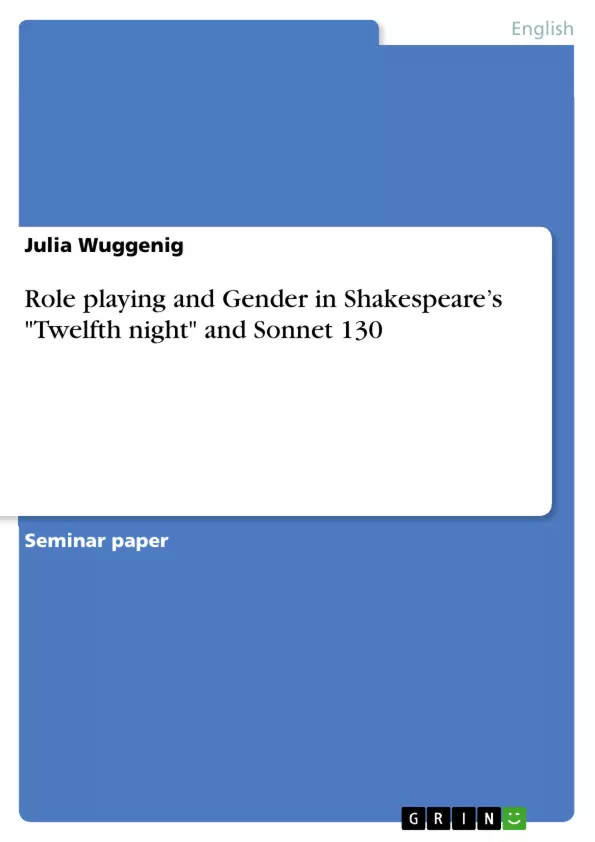I Introduction
This term paper examines the question in what way Shakespeare’s sonnett Nr. 130 represents a woman, how the woman is represented in his 12th Night and how these representations correspond or disagree with the conception of a woman at Shakespeare’s time under the reign of Queen Elizabeth I.
This issues shall be considered under the New Historicist Approach. New Historicism is a literary theory which takes a closer look at cultural concepts and values at a given time and “the relationship between individual subjects and discourses”. (Meyer 189) This means for the examination of Shakespeare’s Sonnett and 12th night: how is a woman represented in the poem? How is a woman represented in the comedy and what does it mean that a woman performs the role of a man? To what kind of woman in Shakespeare’s time under the reign of Elizabeth I could both pieces of literature refer to?
Both the Sonnet and the comedy carry traces of the Petrarcan tradition of poetry. Whereas the Sonnett parodies this traditionnal language of love using the original form altered by “Sir Thomas Wyatt (1503-1542), Henry Howard and Early of Surrey (1517-1547)” (Meyer 53) into the English Sonnet, the comedy parodies the language of the Petrarcan lover by making a woman use this sophisticated language, disguised as a man. The subversive quality of that fact is obvious: a woman impersonating a man on stage could be seen as a parallel to a woman representing a man in English society. But it also points to the real situation of Elizabeth I on the English throne, enacting the duties which were the ones of a King before. This ambigious situation we will examine under the point of view of role game play. If we go back to the Sonnet, we could think about if this Sonnet doesn’t attribute a man’s qualities to a woman as well, as we shall see later.
Inhaltsverzeichnis (Table of Contents)
- I Introduction
- II The Paradox between ordinary women at Shakespeare's time and the role of Queen Elizabeth
- III Gender in Shakespeare's Sonnett Nr. 130.
- IV Role Play in Shakespeare's 12th night.
Zielsetzung und Themenschwerpunkte (Objectives and Key Themes)
This term paper explores the portrayal of women in Shakespeare's Sonnet Nr. 130 and 12th Night. The paper aims to analyze how these representations reflect or deviate from the prevailing understanding of women during Shakespeare's time, specifically under the reign of Queen Elizabeth I. The analysis is conducted through a New Historicist lens, examining the relationship between literary representations and the cultural concepts and values of the period.
- The portrayal of women in Shakespeare's Sonnet Nr. 130
- The representation of women in Shakespeare's 12th Night
- The relationship between these literary representations and the conception of women during Elizabeth I's reign
- The role of gender and role-playing in Shakespeare's works
- The influence of the Petrarcan tradition on Shakespeare's writings
Zusammenfassung der Kapitel (Chapter Summaries)
- I Introduction: This chapter introduces the central theme of the paper, focusing on the representation of women in Shakespeare's Sonnet Nr. 130 and 12th Night, within the context of Elizabeth I's reign. It outlines the approach of New Historicism, emphasizing the examination of cultural concepts and values surrounding the representation of women.
- II The Paradox between ordinary women at Shakespeare's time and the role of Queen Elizabeth: This chapter explores the social and educational realities of women during Elizabeth I's reign. It examines the limitations imposed on women's education and their expected roles in society, contrasting these with the exceptional case of Elizabeth I and her humanist education. The chapter discusses the influence of Protestantism and humanism on women's lives, highlighting the contrasting perspectives on women's roles and freedoms.
Schlüsselwörter (Keywords)
This paper explores the representation of women in Shakespeare's works, specifically Sonnet Nr. 130 and 12th Night, using a New Historicist approach. Key themes and concepts include women's education and roles in Elizabethan society, the influence of Protestantism and humanism, the figure of Queen Elizabeth I, gender, role-playing, and the Petrarcan tradition.
How does Sonnet 130 represent women compared to the Petrarchan tradition?
Shakespeare’s Sonnet 130 parodies the idealized Petrarchan love language by describing his mistress as an ordinary woman with realistic features, rather than a goddess.
What is the significance of role-playing in "Twelfth Night"?
The play uses cross-dressing (Viola disguised as Cesario) to explore gender boundaries and the subversive idea of a woman performing a man's role in society.
How did Queen Elizabeth I influence the conception of women in Shakespeare's time?
As a female monarch with a humanist education, Elizabeth I challenged the social limitations of her time, acting as a "King" and creating a paradox regarding traditional female roles.
What is the New Historicist approach used in this paper?
New Historicism examines literary texts in relation to the cultural values, discourses, and social power structures of the historical period in which they were written.
What were the educational realities for ordinary women in the Elizabethan era?
Most women had limited access to formal education and were expected to focus on domestic duties, contrasting sharply with the education of the nobility and the Queen.



